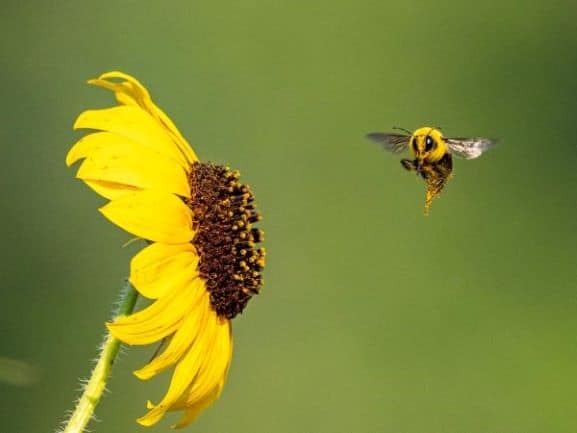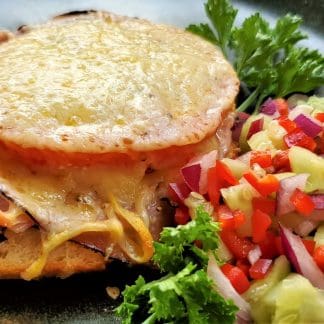Ham, Gruyere and Tomato Toast with Spicy Beer Mustard Spread
The Taste of Summer in a Sandwich
Ham, Gruyere and Tomato Toast, with Spicy Beer Mustard Spread
Summer is rushing past and I’m feeling pushed into September. As the sunlight wanes and temperatures cool, my appreciation increases for the lush and delicious vegetables on display at our Farmer’s Market.
Mid-August is the peak of the season for Farmer’s Market. As I pass by tables heaped with produce, I see and smell and touch the tomatoes, cucumbers, red and green peppers, red onions and potatoes, and luxuriate in the green and wax beans, sweet corn, winter and summer squash and melons.
Nebraska-raised tomatoes and sweet corn make eating and cooking an added pleasure in the summer. Call it terroir or the skill of the gardener/farmer, the hours of sunlight or the irrigation water drawn fresh from the Ogallala aquifer, but all these elements together produce extraordinary flavors for sun-loving vegetables. And now is the time to savor them.
These straw-hat days, taste summer in a sandwich with ham, gruyere and tomato toast topped off with a Buzz Savories Spicy Beer Mustard spread. The combination of rich, smoky ham, tangy mustard, melty cheese and a fresh, ripe tomato is perfect for breakfast or lunch or a light supper.
The Buzz
Life Lessons from Beekeepers
Stop mowing the lawn, don’t pave the driveway, and get used to bugs in your salad
By Siobhan Maderson, Aberstwyth University
For many people, the past year has led to an increased appreciation for our fragile natural world. This is important because, alongside COVID, we are experiencing habitat loss, a global climate and biodiversity crisis.
Here are the main lessons I’ve learned from my time spent researching and working with beekeepers.
Go wild in the garden
Beekeepers recognize that an untidy garden is a wildlife haven and advise letting a little mess into our outdoor spaces. Some beekeepers told me how they’ve stopped mowing their lawns altogether.
In my experience, UK beekeepers avoid using any chemicals in their gardens, as they are all too aware of the damage they cause. In many other countries, and in the EU, domestic and municipal use of garden chemicals has been banned.
Whatever you do, don’t pave over your front garden. Both of these lead to less habitat for wildlife. If you must park your car on a hard surface at home, add in climbing plants and hedges to absorb CO2 and provide forage for insects.
Learn about your neighborhood
Beekeepers often work in one area for years – sometimes even generations. These years of experience in one place show them what’s growing, and what’s living in their area, and what has changed over time. Know your area and what grows nearby. Get to know your local area and what grows nearby.
Think global, act local
If we want to live in a world that is good for pollinators, as well as the rest of us, big changes are needed in our environment, and our food system. This is why many beekeepers change their diet and their shopping, eating more locally grown vegetables that aren’t treated with pesticides.
Being willing to buy fruit and vegetables that may have the occasional insect living in it is better for us and for nature. To live more harmoniously with the natural world, we need to relax about larvae in the lettuce and slugs in the spinach.
-
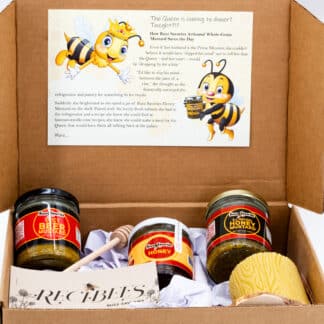
Spicy and Sweet Gift Set
$55.00 Add to cart -
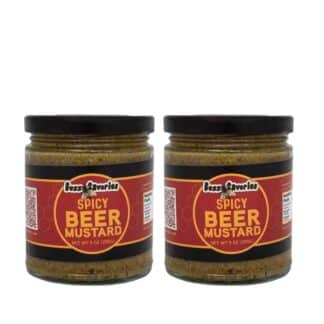
Spicy Beer Mustard
Rated 5.00 out of 5$25.00 Add to cart -
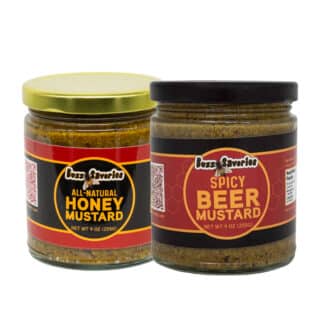
Mix & Match Sets
$25.00 Select options This product has multiple variants. The options may be chosen on the product page
Ham, Gruyere and Tomato Toast with Spicy Beer Mustard Spread
Equipment
- broiler or toaster oven
What You'll Need:
Ham, Gruyere and Tomato Toast with Spicy Beer Mustard Spread
- 6 slices sour-dough bread - toasted a firm, grainy bread of your choice may also work for this sandwich
- 2 Tb. Spicy Beer Mustard or more as needed
- 6 thin slices smoked ham (select for smoky, salty flavor)
- 1 large tomato, sliced into 6 slices
- 8 oz. Gruyere Cheese or a block of Swiss Cheese grated (2 cups) A block of Swiss Cheese may be exchanged for the Gruyere. Buy the block because the cheese needs grating for this sandwich
- 3 tsp. fresh oregano, chopped fine
- ½ tsp. freshly ground pepper and salt (to taste)
How To Prepare:
Ham, Gruyere, Tomato, and Spicy Beer Mustard Toast
- preheat broiler
- toast each slice of sour-dough bread in a toaster
- spread toast with Spicy Beer Mustard
- top each with a ham slice or if thin maybe 2-3 slices
- top with a slice of tomato
- top evenly with shredded Gruyere Cheese or shredded Swiss Cheese
- sprinkle with the the oregano (optional)
- dust with salt and freshly ground pepper (to taste)
- broil for 3-4 minutes until cheese is bubbly (watch with care)


